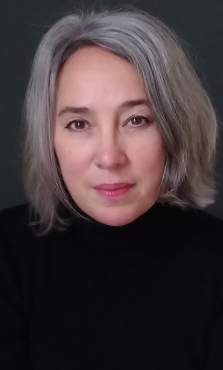You are here
- Home
- Dr Julia Molinari
Dr Julia Molinari
Professional biography
I joined the Open University's Graduate School as a part-time Lecturer in Professional Academic Communication in English (PACE) in December 2021. I formerly taught and researched academic writing at the University of Nottingham, UK and the University of Padova, Italy. Professionally, I also have a background in academic translations, editing and proofreading. I was awarded a PhD from the University of Nottingham, UK, in 2019 thanks to the supervision of Professor Pat Thomson (School of Education) and Professor Andy Fisher (Department of Philosophy). My previous studies include an MA (Hons) in Philosophy and Logic from the University of St Andrews, UK; an MEd (Applied Linguistics) from the Open University, UK; a PGCTEAP (Post Graduate Certificate in Teaching English for Academic Purposes) from the University of Nottingham, UK; and a European Baccalaureat from the European School, UK.
I am a Senior Fellow of the Higher Education Academy (SFHEA) and am bilingual English-Italian and fluent in French.
You can also find me on X @pace_ou (professional account); on Mastodon: https://sciences.social/@serenissimaj (personal account); and on BlueSky: https://bsky.app/profile/serenissimaj.bsky.social (personal account)
Research interests
My research expertise is in academic writing, language, EAP (English for Academic Purposes), Academic Literacies, sociolinguistics, philosophy, sociology, education, and Artifical Intelligence (specifically, how AI re-present imaginaries of what academic writing is).
I am interested in conducting and supervising research on academic writing and communication practices that seeks to question, disrupt, and re-visit received wisdoms about how and why academic knowledge is communicated in some ways but not others as well as why some forms are more valued than others.
In particular, I welcome proposals that deal with:
- histories, cultures, and traditions of academic communication
- theories and practices of academic writing (and their role in including/excluding different research communities)
- higher education policies and practices, and the role that academic writing plays in maintaining these (e.g. citation practices, metrics, the REF, etc.)
- transformative sociologies and philosophies of academic writing (especially Critical Realism and Academic Literacies)
- academic writing practices and their implications for social justice, equality, inclusion, and diversity
- multimodal and multilingual approaches to academic communication
- creative approaches to academic writing
- performativity, plagiarism, and the ethics surrounding this
- emerging and evolving academic writing pedagogies, and related assessment practices
- open access, the politics and economics of academic publishing, and alternative publishing practices (and how academic writing may be affected by pluralising and democratising knowledge).
In my PhD thesis, I argued that academic writing takes many forms and cannot be reduced to standard templates. Using a critical realist lens, I concluded that what makes writing academic are its emergent socio-academic practices, not its constituent forms. This matters because it allows us to re-imagine and think about academic writing as an evolving practice of possibilities and affordances rather than as a set of static and universal conventions. A version of the thesis is now available as a published Open Access research monograph (Bloomsbury, 2022). My research and scholarship have brought into conversation literatures in the cognate interdisciplinary fields of EAP (English for Academic Purposes), Sociolinguistics, Applied Linguistics, Education, Philosophy and Sociology. I am trying to understand in what sense academic writings (i.e. how we write and communicate academically) can be understood as 'social and transformative practices' (as foregrounded in Academic Literacies research) with the intention of developing more socially just and inclusive approaches to knowledge. Since the PhD and monograph, I continue to be increasingly fascinated by the philosophy of Critical Realism as a lens through which to make sense of writing as an emergent 'social practice', as opposed to its more reductive framing as a transferable skill that can be learnt once and for all.
I am keen to develop a deeper and more nuanced understanding of critical realist philosophies (which, since Roy Bhaskar's seminal under-labouring, have branched into different traditions) in order to further theorise the knowledge-oriented practices involved in academic communication, especially in the context of multimodality, emancipatory and democratising pedagogies, and new technologies, such as AI.
I am also keen to research the relationship between plagiarism and standardised writing and assessment practices.
Teaching interests
Coming soon.
Impact and engagement
Coming soon.
External collaborations
Coming soon.
International links
Coming soon.
Publications
Journal articles
The limits of translingualism: In search of complementary forms of resistance (2022-12-20)
Hultgren, Anna Kristina and Molinari, Julia
Apples - Journal of Applied Language Studies, 16(3) (pp. 48-68)
Authored books
What Makes Writing Academic: Rethinking Theory for Practice (2022-03)
Molinari, Julia
ISBN : 9781350243927 | Publisher : Bloomsbury
Book chapters
Critical Realism: What can it do for EAP? (2022-06-27)
Molinari, Julia
In: Ding, Alex and Evans, Michelle eds. Social Theory for English for Academic Purposes Foundations and Perspectives. New Perspectives for English for Academic Purposes (pp. 135-154)
ISBN : 978-1-3502-2919-8 | Publisher : Bloomsbury
Re-imagining Doctoral Writings as Emergent Open Systems (2021)
Molinari, Julia
In: Badenhorst, Cecile; Amell, Brittany and Burford, James eds. Re-imagining Doctoral Writing (pp. 49-69)
Publisher : WAC Clearinghouse
Playing with #acwri: a play on academic writing (2021)
Molinari, Julia
In: Phillips, Richard and Kara, Helen eds. Creative Writing for Social Research: A Practical Guide (pp. 20-24)
Publisher : Policy Press | Published : Bristol
Thesis
What makes writing academic: an educational and philosophical response (2019)
Molinari, Julia
PhD thesis University of Nottingham
